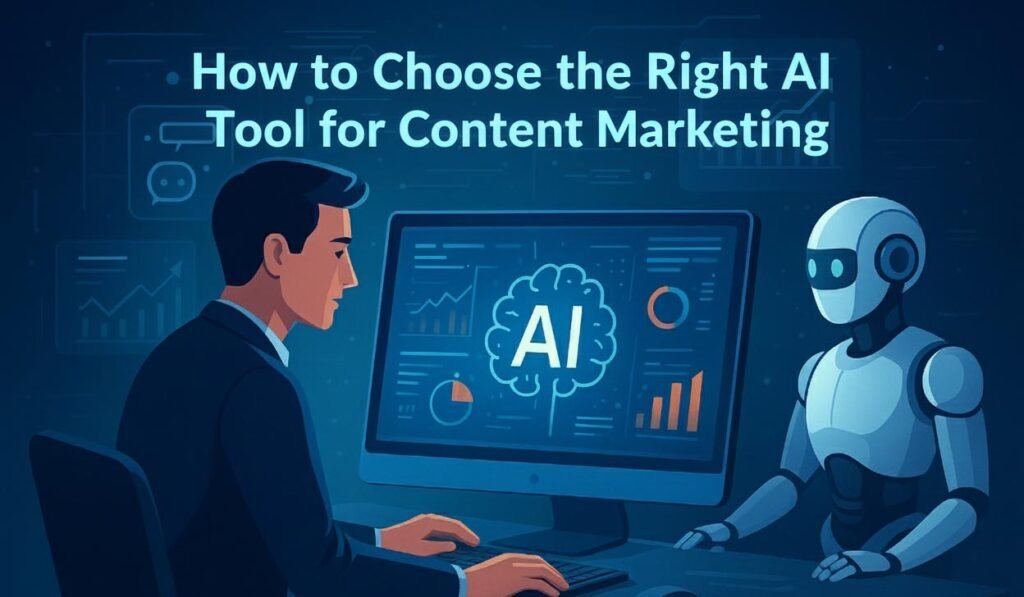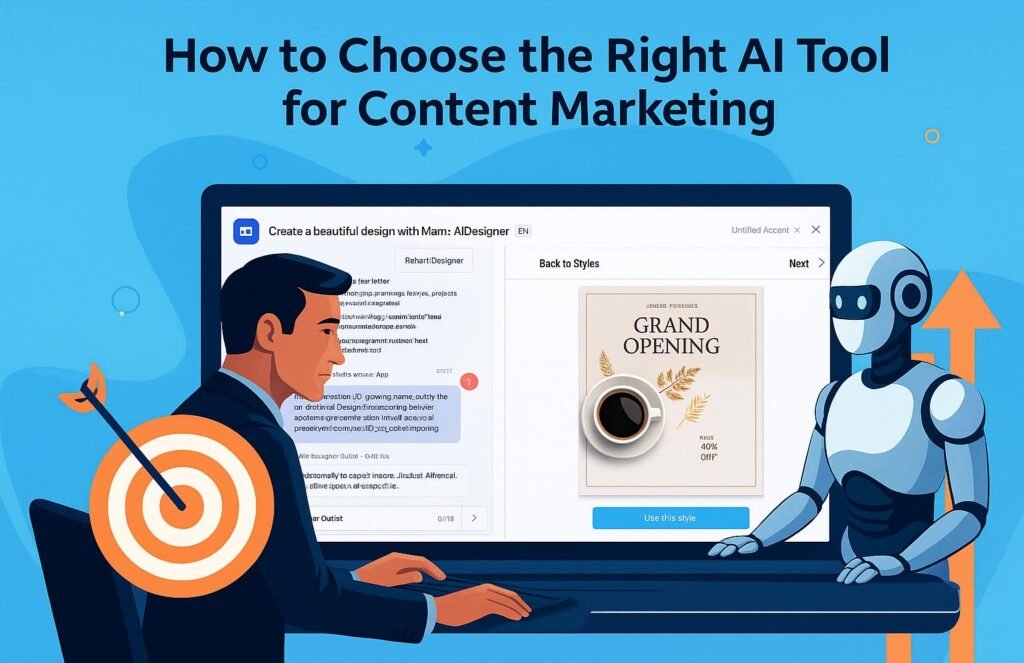How to Choose the Right AI Tool for Content Marketing: 7 Proven Steps for Success

Introduction to AI in Content Marketing
Artificial intelligence (AI) has rapidly moved from being a futuristic concept to a practical solution for businesses of all sizes. In content marketing, AI has become a game-changer—helping marketers create, optimize, and distribute content faster and smarter than ever before. But with so many tools flooding the market, the real challenge isn’t finding an AI solution; it’s choosing the right AI tool for content marketing that matches your goals and budget.
In this guide, we’ll break down the different types of AI tools available, key factors to consider, comparisons of popular platforms, and a step-by-step process to make the best decision. By the end, you’ll be equipped to confidently select the right AI tool for your content strategy.
Why AI is Revolutionizing Digital Marketing
AI is revolutionizing digital marketing because it helps solve three major challenges: time, personalization, and performance. Traditional content creation can be slow, inconsistent, and hard to scale. AI tools, however, can generate blog drafts in minutes, suggest SEO improvements instantly, and even personalize marketing campaigns for different audience segments.
According to HubSpot’s 2025 marketing trends report, more than 70% of businesses now use AI in their content strategies—and that number is growing daily.
Benefits of Using AI Tools in Content Marketing
Efficiency: AI can generate content in seconds, freeing marketers to focus on strategy.
Consistency: Tools help maintain tone, brand voice, and messaging across channels.
SEO Optimization: Many AI tools include built-in keyword research and ranking suggestions.
Personalization: AI analyzes user data to deliver hyper-relevant content.
Analytics: AI-powered insights make it easier to track performance and refine campaigns.
Understanding Different Types of AI Tools
AI is not a one-size-fits-all solution. Different tools specialize in different aspects of content marketing. Knowing the categories helps you match the tool to your business needs.
AI for Content Creation (Text, Blogs, Social Media)
These tools generate written content—from blog articles to LinkedIn posts—based on prompts you provide. Platforms like Jasper AI and Copy.ai are popular choices, offering templates for product descriptions, ads, and social posts.
Best for: Brands needing fast, scalable text creation.
AI for SEO Optimization
Search engines are competitive, and ranking high requires strategy. Tools like Surfer SEO and Clearscope analyze top-ranking pages and suggest keywords, content structure, and optimization tips.
Best for: Content teams focusing on organic traffic growth.
AI for Audience Analysis and Personalization
AI-driven analytics platforms, such as HubSpot AI or Persado, track user behavior and help deliver personalized campaigns. They tailor messages based on demographics, buying behavior, or previous interactions.
Best for: Businesses prioritizing lead nurturing and engagement.
AI for Visual Content and Graphic Design
Visuals matter as much as text. Tools like Canva AI and Adobe Firefly allow marketers to design images, infographics, and even short videos. AI speeds up the design process and ensures brand consistency.
Best for: Social media-heavy campaigns and brands needing frequent visual content.
AI for Marketing Automation and Analytics
AI tools such as HubSpot AI or MarketMuse don’t just generate content—they automate distribution and provide insights into what works. They evaluate performance metrics and optimize campaigns in real time.
Best for: Businesses wanting a complete, data-driven marketing solution.

Key Factors to Consider Before Choosing an AI Tool
With so many AI tools available, it’s easy to feel overwhelmed. Here’s how to narrow your choices.
Define Your Content Marketing Goals
Do you want to generate more content quickly, rank higher in search results, or improve personalization? Your goal determines the tool.
Ease of Use and Integration with Existing Tools
An AI tool should fit seamlessly into your workflow. Look for integrations with WordPress, HubSpot, or Google Analytics.
Pricing and Scalability
AI tools range from free basic plans to enterprise-level solutions costing thousands. Start small, but ensure the tool can scale with your business growth.
Accuracy, Reliability, and Data Security
Not all AI-generated content is accurate. Choose a platform with a reputation for reliability and clear data security policies.
Customer Support and Community
Strong support and active communities help you troubleshoot issues and get the most out of your investment.
Comparing Popular AI Tools for Content Marketing
| Category | Tool A | Tool B | Best For |
|---|---|---|---|
| Content Creation | Jasper AI | Copy.ai | Blogs, Ads, Social Media |
| SEO Optimization | Surfer SEO | Clearscope | Ranking, Keyword Strategy |
| Visual Content | Canva AI | Adobe Firefly | Graphic Design, Branding |
| Automation & Analytics | HubSpot AI | MarketMuse | Campaign Management, Data Insights |
Step-by-Step Guide: How to Choose the Right AI Tool
Step 1: Identify Your Content Needs
Start by asking: What’s slowing down my marketing team? Is it content creation, SEO, or analytics?
Step 2: Test with Free Trials or Demos
Most platforms offer free trials—use them to test features, speed, and accuracy.
Step 3: Check Real User Reviews
Look at platforms like G2 or Capterra for unbiased reviews before committing.
Step 4: Evaluate Long-Term ROI
Don’t just focus on the monthly cost—measure the tool’s ability to save time, improve results, and scale campaigns.
Common Mistakes to Avoid When Choosing AI Tools
Over-relying on One Tool: AI is powerful, but human oversight ensures creativity and authenticity.
Ignoring Data Privacy Concerns: Always check if the platform complies with GDPR or local privacy laws.
Choosing Based Only on Price: The cheapest option might not have the features you need.
Future Trends in AI for Content Marketing
AI-Powered Hyper-Personalization: Expect AI to deliver messages tailored to individuals, not just segments.
Predictive Analytics and Customer Insights: Tools will anticipate customer behavior before it happens.
AI-Generated Video and Voice Content: Beyond text and images, AI will soon dominate video marketing.
FAQs About Choosing AI Tools for Content Marketing
Q1: Are AI tools replacing human content creators?
No. AI speeds up tasks but human creativity and strategy remain essential.
Q2: What’s the best AI tool for beginners?
For text, Copy.ai is beginner-friendly. For design, Canva AI is great for non-designers.
Q3: How much should I budget for an AI tool?
Small businesses may spend $20–$100 monthly. Larger enterprises can expect higher costs for advanced features.
Q4: Can AI tools help with SEO automatically?
Yes. Platforms like Surfer SEO and Clearscope analyze ranking data and recommend improvements.
Q5: Is my data safe with AI tools?
Reputable platforms use encryption and follow data compliance laws. Always check their privacy policy.
Q6: How do I measure success after adopting AI tools?
Track metrics like time saved, content performance, engagement rates, and ROI.
Conclusion: Making the Smart Choice
Choosing the right AI tool for content marketing is about aligning technology with your goals. Define your needs, test tools before committing, and focus on scalability and support. AI won’t replace human marketers, but it will empower them to work faster, smarter, and more creatively.
